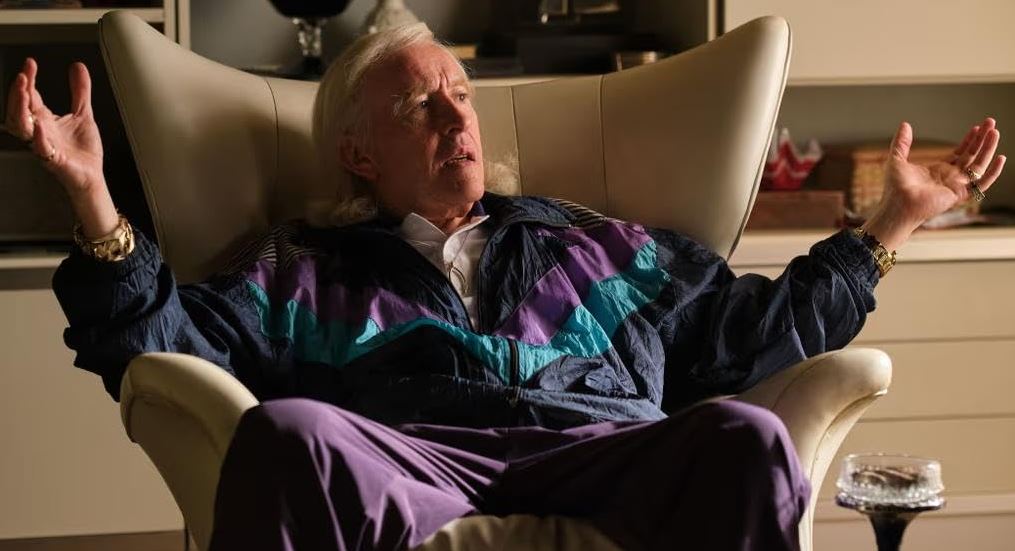| Worth seeing: | for Coogan's portrayal of the sly, power-hungry sex abuser rather than any attempt to understand what drove him |

| Featuring: | Steve Coogan, Fenella Woolgar, Gemma Jones, Julian Rhind-Tutt, Mark Lewis Jones, Mark Stanley, Michael Jibson, Neil Pearson, Peter Wight, Robert Emms, Siobhan Finneran, Tommy Finnegan |
| Key crew: | David Blair, Sandra Goldbacher, Clare Shepherd, Dan Davies, Neil McKay |
| Channel: | BBC iPlayer, BBC1 |
| Length: | 59 minutes |
| Episodes: | 4 |
| Broadcast date: | 9th October 2023 |
| Country: | UK |
WHAT’S IT ABOUT?
In the early 1960s, an ambitious DJ, Jimmy Savile (Steve Coogan), is making a name for himself in clubs in Manchester and Leeds.
As he grows in popularity and influence, he starts working in hospitals, entertaining the children – and soon, he’s presenting radio shows and convincing the BBC that he’s the man to take on a new music chart show – Top of the Pops.
His star keeps on rising, as he persuades the BBC to let him present a new show that makes children’s dreams come true – Jim’ll Fix It – and before long, he finds himself advising the prime minister, Margaret Thatcher and socialising with – as he was then – Prince Charles.
But away from the cameras, he was a seedy, sleazy sex abuser, taking advantage of his power and influence to attack vulnerable young women and men – and on the rare occasions when questions were raised, his fame came out on top.
It was only after his death, when he could no longer intimidate his accusers, that the true Jimmy Savile was revealed to the world.
WHAT’S IT LIKE?
It’s taken more than fifty years for Jimmy Savile’s crimes to come to public attention – and it’s taken more than another decade for the astonishing events to reach the screen.
Many viewers will remember the way the scandal unfolded in news bulletins – younger viewers will perhaps find it even harder, with their experience of social media, that the truth about Savile didn’t emerge until after his death.
But with a narrative so shocking, it’s hard for this four-part TV drama to do it justice. While Steve Coogan is frighteningly convincing as the older Savile – even down to the voice, how he managed to carve his niche and win over the powers that be – from TV producers to the prime minister – doesn’t feel right. He’s certainly cocky and self-confident – but he’s never charming, warm or even funny. It’s one thing to believe that people in authority might protect someone who brings them great fortune – as almost certainly still happens now – but it’s another to understand why it was that those people in power fell under his spell in the first place.
One thing the writers can’t quite decide – so they have characters articulate both sides – is whether Savile supported charities to gain access to vulnerable people or do assuage his own guilt at his behaviour. But it’s less interested in why Savile was like he was. What drove him? Had he been abused as a child? Was he a pervert, driven by an uncontrollable sex drive? Or was it more about control – power – influence. The suggestion is that he wanted to show his overbearing mother that he was a son to be proud of. We don’t get a sense that he was abusing people for sexual pleasure – but to boost his own confidence – to show himself that he could wield power – that he could get away with anything – something that emboldened him to pursue political influence – in many senses, the victims of his abuse were simply stepping stones to his ultimately goal – his knighthood.
Coogan’s Savile comes across as more selfish and evil when he’s letting former allies fall by the wayside when the authorities come calling, despite the support they had previously shown him, than when he’s grooming youngsters. And we don’t get a sense of the scale of his crimes – we see a handful of attacks over four hours – in reality, there were hundreds – that shifts the dial. I’m not asking the see the horror of the sexual assaults, but the actual attacks are so far from the screen that we are not sharing the experience of his victims – the way this drama is constructed, it’s almost as if we’re in the position of the incredulous enablers who can’t quite believe that their star is really capable of such atrocities.
There doesn’t seem to be much of a reason to be telling this story now – but the historical perspective almost gives comfort that unlikely as it was that someone would have been doing what he did for so long, it would be almost impossible for anyone to get away with crimes on this scale in this day and age, with rumours flying around constantly on social media as youngsters themselves are emboldened to tell their stories. But one of the most insidious skills of an abuser is to spot the most vulnerable – the least emboldened – those least able to fight back and raise the alarm.
What have we learned from history that could protect young people now? Does this drama add anything to the discourse? The fact that – as history bears witness – Savile got away with it means there’s little chance of coming away from this drama with any sense of the story itself – or this portrayal of it – adding much to our understanding of the human condition.
